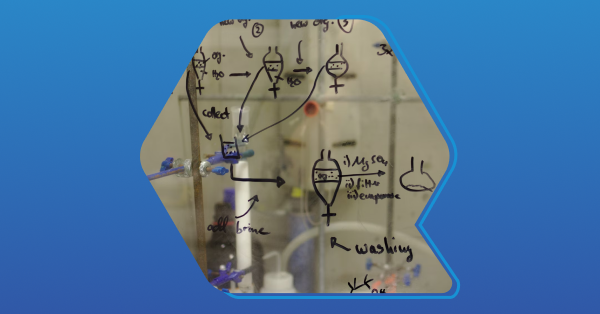Benchling vs Labguru vs QBench: Which LIMS is Best?

Benchling is one of the titans in lab software for biotech labs; Labguru positions itself as an easier-to-use yet still robust LIMS; and QBench earns top marks as one of the most configurable LIMS on the market.
Which will you choose?
The choice isn’t exactly clear-cut. It depends on your lab size, needs, capabilities, and regulatory requirements. In this guide, we’ll share the pros and cons of these three platforms to help you make the right choice for your lab.
LIMS vs ELN: Which is Right for Your Lab?
The first choice you need to make is whether you need a LIMS or an ELN.
While Labguru and Benchling both offer some LIMS features, they are considered ELNs first, and LIMS second.
The distinction here is significant. ELNs (electronic lab notebooks) are digital versions of paper lab notebooks, while LIMS (lab information management systems) are much more robust software platforms.
It’s not that ELNs are bad platforms or unsuitable for lab use. ELNs are fantastic tools, in the right context. If you’re taking a first step toward digitizing your lab’s data, inventory, and test results, then an ELN is a great tool. But if you need to do things like:
- Generate COAs
- Batch run tests and automatically re-run if results are out of spec
- Provide a self-service customer portal
- Integrate instruments through native and API integrations
- Automate processes
Then an ELN just won’t support you as well as a LIMS. This alone might make QBench the better choice when compared to Labguru and Benchling (though check out our guide to the best LIMS for a full roundup of your options).
What Makes a LIMS Right for Your Lab?
Some LIMS are open source, some are self-hosted, and some are hosted in the cloud. Which will you choose?
There’s no true one-size-fits-all platform. To help you make the right choice for your lab, we recommend considering the following:
- LIMS-first, not second: Both Labguru and Benchling are ELNs first, and a LIMS second. As shared above, if you’re in the market for an electronic lab notebook, that’s not necessarily a bad thing. But an ELN is not a substitute for a fully-featured LIMS.
- Configurable versus customizable: Somewhere in your search for a LIMS, you’ll come across two terms: configurable and customizable. Customizable LIMS often require custom code and development resources to set up and maintain, while configurable LIMS offer no-code solutions in-app for any user on your team to create workflows in your LIMS.
- Automation capabilities: The power of a LIMS lies in its ability to automate tasks, processes, and workflows for your lab. This automation saves time and reduces the room for human error (which can cause further delays or compliance issues).
- Implementation timeline: Look for a LIMS with a fast, thorough, and efficient implementation so your lab can get set up right away and focus more on science.
- Quality of customer support: Whenever you buy software, prioritize the support that you’ll get. A LIMS with strong support provides your team with a safety net you can rely on when you have questions or encounter issues. Make sure to avoid vendors, though, that lock you into expensive pro services contracts for every small change.
- Custom fields and permissions: This is a big one, especially for specific industries and compliance regulations. Look for a LIMS that can adapt to your unique needs and use cases and provides adequate security measures to protect your data.
Now, let’s take a closer look at how these three LIMS platforms compare.
QBench
QBench is a fully configurable and flexible cloud-hosted LIMS, ideal for labs looking for a platform that empowers their work rather than getting in the way.
Unlike legacy LIMS vendors that lock you into expensive pro services contracts, QBench puts the power of configuration in your hands. Whether you want to generate a report, batch run a test, or create a self-service portal for internal and external customers, you can build it in QBench.
Many QBench customers have felt the pain of legacy LIMS and how vendor-created, code-driven customizations lead to slow, costly updates. Rather than slow you down, QBench’s deep workflow configurability and flexible, easy-to-use tools allow for quick workflow adjustments, report modifications, and automation tweaks.
It’s no wonder that time and time again, QBench leads the pack on G2. Among its most recent accolades are badges for:
- #1 Usability Index
- #1 on Momentum Grid
- High Performer in LIMS for the Overall, Small Business, and Mid-Market
- #1 Relationship Index
QBench is fast to implement as well, especially when compared to legacy vendors.
After working with hundreds of labs, we’ve found there can be a temptation to get everything configured perfectly before going live (you may have heard this referred to as a “Big Bang” approach). The labs we serve work in regulated industries, so we get why this is sometimes the initial desire of a lab. Rather than delaying the value of working software by trying to set (and test) everything at once, QBench takes a “phased approach,” partnering with you to identify the essential pieces to get up and running first. By taking a phased approach, labs don’t bite off more than they can chew on the initial project. This helps them move faster and get value more quickly.
QBench is privately owned by a group of families and software investors with over 30 years of lab experience and a long-term time horizon, meaning that they prioritize building the best culture, continuous innovation, and a business that drives value for customers for many years to come. QBench's employees are distributed globally to serve customers worldwide, but most (85%) are in North America (as of 2025).
QBench Price: QBench starts at $275/month for five users, with implementation and training costs ranging from $5,000-$10,000.
Top Features:
- Configurable workflows
- Reporting tools
- Custom fields
- A Customer Portal
- No-code Automations
- Inventory Management
- QMS (Quality Management System)
- Billing Management
- A RESTful API
- Powerful admin controls & user permissions
Industries served:
And more!
Labguru
Labguru is an excellent option for small labs looking to streamline and scale their operations with a focus on simplicity, ease of use, and user-friendliness.
As mentioned above, Labguru is more ELN-forward and focused on inventory management, but it does offer a LIMS as well with features for inventory management, automation, and reporting.
Previously, Labguru was owned by Holtzbrinck Publishing Group, a European publishing house. As of 2025, Labguru is now owned by Titian Software, a UK-based Sample Management business, which is itself owned by the private equity division of Battery Ventures. Roughly 43% of its staff are located in Europe and the Middle East, 30% in North America, and 28% in Asia.
Like QBench, Labguru is well-reviewed on G2 with an overall rating of 4.6/5. 34% of their reviews are from customers in Europe, 32% from the Middle East, and 32% from North America (according to LinkedIn).
Labguru Price: Not available
Top features:
- ELN first and foremost
- Inventory management
- Reports and visualizations in premium tiers
- Automation in premium tiers
- API support in premium tiers
Industries served:
- Biotech
- Pharma
- Food and Beverage
- Molecular farming
- CRO/Service labs
- QC Labs
Benchling
Benchling is another popular LIMS platform, though, like Labguru, it is traditionally more of an ELN-forward product than a true LIMS. Benchling offers a suite of ELN and LIMS features, and is typically best suited for labs in the biotech and genomics industries.
Of the three on this list, Benchling is most specialized for the needs of biotech, genomics, and healthcare labs, and for that reason, it’s a common choice in those industries. Given that level of specialization, Benchling is far and away the most expensive vendor of the three, so if your lab is price-conscious, you may want to consider Labguru or QBench.
Benchling is privately owned by 23 investors. Roughly 87% of its employees are based in North America, and 11% are in the EMEA region (according to LinkedIn). Benchling is well-reviewed on G2 with 4.5/5 stars. However, they haven't had a new review on G2 since January 2025.
Benchling Price: Last published on its website in 2020, pricing started at around $20,000/year for five users on the professional plan. It’s possible that the pricing has increased significantly since then.
Top features:
- Centralize and standardize data
- Generate reports and visualizations
- Manage workflows
- Sample and inventory management
Industries served:
- Biopharmaceutical
- Biotech
- Agriculture
Labguru vs Benchling vs QBench: Side by Side
If you’re still unsure which of these three platforms is right for you, let’s make it even easier.
Choose QBench if…
- You want a LIMS-first platform
- You value configuration and control
- You want API access
- You need an integrated QMS
Choose Labguru if…
- You’re a smaller lab prioritizing ELN functionality and inventory tracking
- You’re early in your digital transformation
- You don’t need complex regulatory workflows yet
Choose Benchling if…
- You want an ELN first and LIMS second
- You’re a biotech/genomics lab with complex R&D and collaboration needs
- You have the budget and IT support for a more enterprise-grade, ELN-centric platform
Modern Labs Get More Done With QBench
There are several reasons why QBench is a consistent leader across categories on G2, but they all boil down to a singular point: Labs can get more done with QBench LIMS.
While many legacy LIMS are complex and constraining, QBench frees up modern labs to focus more on science and less on managing clunky software. Specifically, labs love QBench for the following reasons:
- LIMS first and foremost
- Configurable automations
- API support
- Ease of use and customer-centric approach
QBench is a LIMS First and Foremost
Unlike Labguru and Benchling, QBench is a LIMS through and through.
As we’ve explained above, it’s not that ELNs are bad platforms or unsuitable for lab use. ELNs are fantastic tools – in the right context.
If you’re taking a first step toward digitizing your lab’s data, inventory, and test results, then an ELN is a great tool. But if you need to manage data and processes at scale, an ELN just won’t support you as well as a LIMS.
If you need advanced support for automation and data management in a configurable platform that you can control, then QBench is the LIMS for you.
Configurable Automations
Automation is key for modern labs, and the lack of configurable automation is one of the top reasons modern labs should consider a fully-featured LIMS over ELNs like Benchling and Labguru.
Terms like “configurability” and “no-code” are becoming buzzwords in the LIMS industry, but for QBench, they are anything but. QBench takes a configurable approach to LIMS, which means you don’t need vast IT resources or expensive development contracts to adjust workflows or make simple changes.
With QBench’s workflow and automation tools, you can:
- Trigger processes for your lab.
- Easily update a process or roll out new processes.
- Save time by automating inventory stock.
- Run calculations, generate reports, and notify customers when results are ready.
- Set up workflows between various tools, including a client portal, billing, QuickBooks, inventory management, and quality management systems.
There is no need for complex development work or custom code; most legacy LIMS sell you the dream but deliver the nightmare. With QBench, you’ll need to pinch yourself after seeing what you can configure on your own.
RESTful API Support
The more connected your lab software and instruments are, the smoother the process will be as you scale. That’s why QBench offers a RESTful API that allows you to:
- Connect laboratory instruments with the LIMS for automatic integration and a comprehensive view of your data.
- Import or export data from external systems or to other systems. You can even use AI to make better decisions about your data.
- Generate custom reports from LIMS data by integrating with external reporting systems.
- Integrate LIMS data with a dashboard or visualization tool. This enables real-time monitoring of laboratory processes, providing valuable insights into lab performance.
We’ve heard horror stories from labs that worked with legacy LIMS systems that claimed to offer an API, but required spinning up a new endpoint for each new client. One lab made a change to their data model and had to wait nine months for that change to be accessible via API. In contrast, QBench’s API support adds to the flexibility of its LIMS, helping you get more done and achieve your laboratory objectives.
Ease of Use and Customer-Centric Approach
All of these powerful features are great, but if your LIMS isn’t easy to implement and use, they are all for naught. Fortunately, QBench consistently earns high marks for ease of use thanks to its:
- Modern, fast, user-friendly interface.
- Configurable and flexible workflows — if you can dream it, you can build it with QBench. More importantly, you can easily modify it over time yourself.
- Simple and automated data entry.
- A consultative and phased approach to implementation, helping you hit the ground running sooner than other LIMS.
Megan, of EO Science, says it best after choosing QBench over seven other LIMS:
“QBench is easy to use and understand, allowing Laboratory Management to configure almost everything with minimal support needed. It is highly configurable while not overwhelming. Implementation is much faster than other systems due to the ease of use and configuration. Plus, QBench is constantly enhancing the product with new features and providing easily accessible help tools.”
Any vendor can launch a flashy software product with a slick interface. QBench takes this one step further by taking care to partner with its customers, giving labs a powerful software platform with guidance and insights to put it to work. We regularly speak with our customers and integrate their feedback and feature requests into our product development process.
We believe in building a LIMS that empowers labs to get more done, and that starts with taking their needs and feedback seriously.
Don’t Take our Word for it: Put QBench to the Test With a Free Demo
So, between these three leading scientific software platforms, which will you choose?
Both Benchling and Labguru are excellent ELNs with LIMS features built in, but if your lab is looking for a LIMS that provides:
- Robust integrations and API access
- Automation
- Reporting
- No-code configuration
- Ease of use
- Excellent support
- Customer-centricity
- Robust quality checking
- Competitive pricing
We suggest QBench: a LIMS that helps your lab work smarter with unparalleled flexibility to drive whatever the future brings.
Click the button below to schedule a demo and see for yourself.






